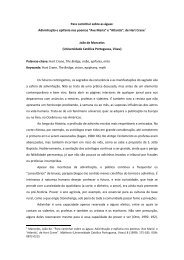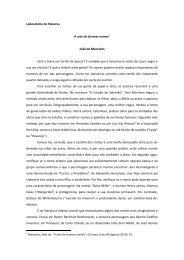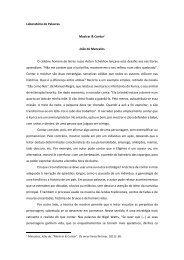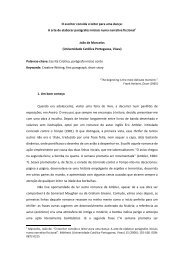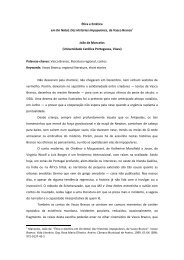Notas para o Cantos das Aves em Eugénio de Andrade e em Três ...
Notas para o Cantos das Aves em Eugénio de Andrade e em Três ...
Notas para o Cantos das Aves em Eugénio de Andrade e em Três ...
You also want an ePaper? Increase the reach of your titles
YUMPU automatically turns print PDFs into web optimized ePapers that Google loves.
i<strong>de</strong>ias e estados <strong>de</strong> espírito: “I found at last what I have been seeking always, a life of<br />
or<strong>de</strong>r, and of labour, where all the outward things were the image of na inward life”<br />
(Malins, 1980: 167).<br />
“The Wild Swans at Coole” constitui um excelente ex<strong>em</strong>plo <strong>de</strong> como a natureza<br />
po<strong>de</strong> espelhar os sentimentos <strong>de</strong> um escritor — neste caso, a paixão não correspondida<br />
<strong>de</strong> Yeats por Maud Gone e a sua filha Isaualt Gone. No entanto, num plano mais<br />
profundo, o po<strong>em</strong>a ultrapassa a esfera íntima, e lida com o t<strong>em</strong>a universal da dialética<br />
entre morte e imortalida<strong>de</strong>, e também com as questões dolorosas da perda e da<br />
transitorieda<strong>de</strong>.<br />
A primeira estrofe do texto <strong>em</strong> análise, estabelece uma atmosfera <strong>de</strong> serenida<strong>de</strong><br />
pastoril, suav<strong>em</strong>ente melancólica, pintada <strong>em</strong> tons outonais, no <strong>de</strong>clinar <strong>de</strong> um dia <strong>de</strong><br />
Outubro, que po<strong>de</strong> representar também o início da velhice <strong>de</strong> Yeats:<br />
The trees are in their autumn beauty,<br />
The woodland paths are dry,<br />
Un<strong>de</strong>r the October twilight the water<br />
Mirrors a still sky;<br />
(Yeats, 1990: 147)<br />
No lago Coole, cujas águas reflet<strong>em</strong> a acalmia do céu, nadam cinquenta e nove<br />
cisnes, aves centrais ao texto, e menciona<strong>das</strong> também no título: “Upon the brimming<br />
water among the stones / Are nine-and-fifty Swans” (Yeats, 1990: 147).<br />
Decorreram <strong>de</strong>zanove anos <strong>de</strong>s<strong>de</strong> que o bardo apreciou, pela primeira vez, a<br />
beleza cândida <strong>de</strong>stas aves: “The nineteenth autumn has come upon me / Since I first<br />
ma<strong>de</strong> my count” (Yeats, 1990: 147, 148). Foram t<strong>em</strong>pos <strong>de</strong> mudanças profun<strong>das</strong> não<br />
apenas na vida <strong>de</strong> Yeats como hom<strong>em</strong>, escritor e patriota da Irlanda, mas também no<br />
curso da História. Basta recordar a Primeira Guerra Mundial (1914-18) ou a Guerra<br />
Civil Irlan<strong>de</strong>sa (1922-23), conflito que fraturou a socieda<strong>de</strong> e ainda hoje apresenta<br />
repercussões. O poeta pesa, com alguma melancolia, estas transformações, e sente que<br />
envelheceu:<br />
All’s changed since I, hearing at twilight,<br />
The first time on this shore,<br />
The bell-beat of their wings above my head,<br />
Trod with a lighter tread.<br />
(Yeats, 1990: 147)<br />
Por contraste, <strong>para</strong> os cisnes, indiferentes às atribulações da História humana ou<br />
12



